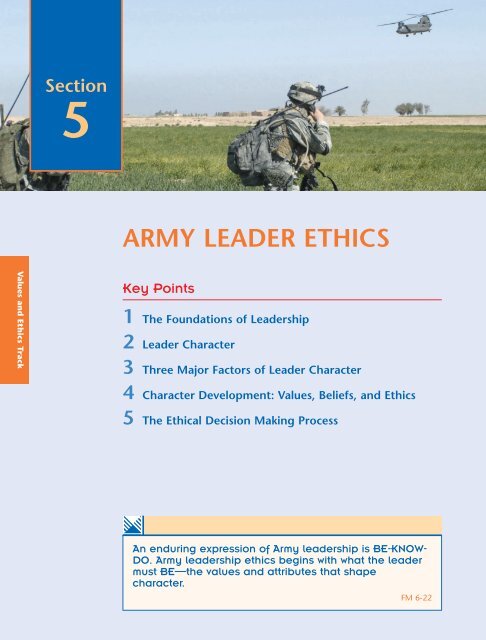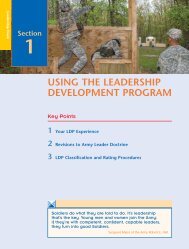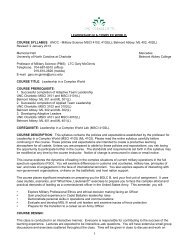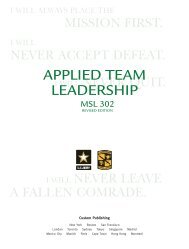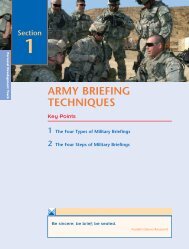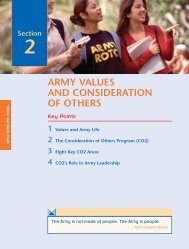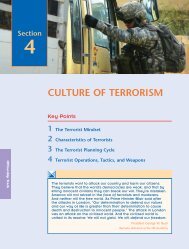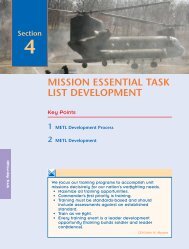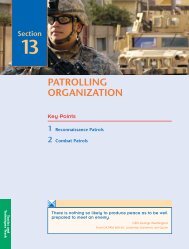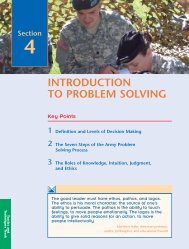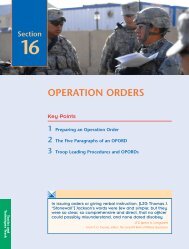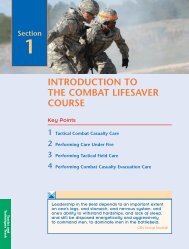Army Leader Ethics.pdf - UNC Charlotte Army ROTC
Army Leader Ethics.pdf - UNC Charlotte Army ROTC
Army Leader Ethics.pdf - UNC Charlotte Army ROTC
- No tags were found...
You also want an ePaper? Increase the reach of your titles
YUMPU automatically turns print PDFs into web optimized ePapers that Google loves.
Section5ARMY LEADER ETHICSValues and <strong>Ethics</strong> TrackKey Points1 The Foundations of <strong>Leader</strong>ship2 <strong>Leader</strong> Character3 Three Major Factors of <strong>Leader</strong> Character4 Character Development: Values, Beliefs, and <strong>Ethics</strong>5 The Ethical Decision Making ProcesseAn enduring expression of <strong>Army</strong> leadership is BE-KNOW-DO. <strong>Army</strong> leadership ethics begins with what the leadermust BE—the values and attributes that shapecharacter.FM 6-22
126 ■ SECTION 5Critical ThinkingeDoes being loyal to SSG Michaels require SGT Kirk to falsify Michaels’s EFMBscore? How would falsifying the record affect the sanctity, honor, and tradition ofthose Soldiers who actually earned their EFMB? How would those who promotedSGT Kirk feel about promoting him if they discovered he falsified SSG Michaels’sEFMB record? Do you think more Soldiers would expect a “Go” at SGT Kirk’sstation if word got out?ethicsprinciples or standardsof behavior that guideprofessionals to do whatis right or good<strong>Ethics</strong> are principles or standards of behavior that guide professionals to do what is right orgood. Ethical leaders do the right things for the right reasons, even when no one is watching.But figuring out what is the right action to take is often a most difficult task. To fulfillyour duty, maintain your integrity, and serve honorably, you must be able to reason ethically.Occasionally, when there’s little or no time, you will have to make a snap decision basedon your experience and intuition about what feels right. For <strong>Army</strong> leaders, such decisionsare guided by <strong>Army</strong> Values, the institutional culture, and the organizational climate. Theseshared values then serve as a basis for the whole team buying into the leader’s decisions.When there is time to consider alternatives, you should ask for advice, and think thingsthrough. You can make a deliberate decision. First, determine what’s right by law andregulations. In gray areas requiring interpretation (and you will see plenty of these inyour career), apply <strong>Army</strong> Values to the situation. Inside those boundaries, determine thebest possible answer from among competing solutions, make your decision, and act on it.When in doubt, always think about how your actions would be perceived if published inthe newspaper or as a story on the evening news as in the vignette below.May 8, 2004—An anonymous note slipped under a superior’s door by a part-timeSoldier from Pennsylvania triggered the Iraq prison abuse scandal now engulfingthe US military and administration.The act eventually catapulted the name of Joseph Darby, a 24-year-oldreservist in the 372nd Military Police Company, from comfortable obscurity to thefloor of Congress where he was praised today by Defense Secretary DonaldRumsfeld for his “honorable” conduct. . . .An article in New Yorker magazine identified Darby as the Soldier who soundedthe alarm over the treatment of Iraqi detainees in Baghdad’s Abu Ghraib prison.According to the transcript—obtained by the magazine—of a military hearing inApril, an <strong>Army</strong> Criminal Investigation Agent, Scott Bobeck, said a fellow Soldierhad given Darby a compact disc with images of naked detainees being mistreated.Outraged by what he saw, Darby “initially put a letter under our door,” saidBobeck.“Then he later came forward and made a sworn statement. He felt very badabout it and thought it was wrong.”
<strong>Army</strong> <strong>Leader</strong> <strong>Ethics</strong> ■ 127Testifying before the Senate Armed Services Committee, Rumsfeld, despite thepressure over his action, praised Darby for acting on his conscience. “It’simportant for the American people and the world to know that while theseterrible acts were perpetrated by a small number of US military, they were alsobrought to light by the honorable and responsible actions of other militarypersonnel,” Rumsfeld told politicians.“There are many who did their duty professionally, and we should mentionthat, as well—first, Specialist Joseph Darby, who alerted the appropriateauthorities that abuses were occurring,” he said.Agence France-PresseCritical ThinkingeWhy do you think more Soldiers did not come forward to report the abuses atthe Abu Ghraib prison?General Ways to Determine the Right Thing• Intuition• Established standards of excellence (Virtues)• Greatest good for greatest number• Duty to others• Care for others• Professional standards (e.g., <strong>Army</strong> Values, Law of Land Warfare)The Foundations of <strong>Leader</strong>shipThe <strong>Army</strong> provides its leaders a solid basis for making ethical decisions. The foundationsof <strong>Army</strong> leadership themselves rest on solid bedrock, including:1. The Constitution of the United States2. Your oath of office3. The Soldier’s Creed4. Field Manual 1 (FM 1).Understand Your Constitutional Duties as an <strong>Army</strong> OfficerMembers of the American military profession swear to support and defend a document,the Constitution of the United States—not a leader, people, government, or territory. Thatsolemn oath ties military service directly to the founding document of the nation. It instillsa nobility of purpose within each member of the Armed Forces and provides deep personalmeaning to all who serve. The profession holds common standards and a code of ethicsderived from common moral obligations undertaken in its members’ oaths of office. These
128 ■ SECTION 5unite members of all the Services in their common purpose: defending the Constitutionand protecting the nation’s interests, at home and abroad, against all threats.Under the Constitution, Congress, representing the people, has authority “to raise andsupport Armies…[and] To provide and maintain a Navy.” Congress also passes laws thatapply to the land and naval forces and appropriates funds for their missions. The Constitutiondesignates the president as commander in chief of the Armed Forces. Once the Congresshas approved the use of force, the president directs that use. The judicial branch interpretslaws passed by Congress as they apply to the Armed Forces and the authority of the presidentas commander in chief. Thus, the military is responsible to the legislative, executive, andjudicial branches of the government in their separate functions.As a platoon leader, you will be part of a chain of command that starts with thecommander in chief and passes through the secretary of Defense, the secretary of the <strong>Army</strong>,the <strong>Army</strong> chief of staff, on down to your brigade commander, company commander, andyou. All of you have the same responsibility to uphold and defend the Constitution of theUnited States. That is what the American people expect of you—and they expect you todo it as ethically as possible.Honoring Your Oath as an <strong>Army</strong> OfficerOn taking the <strong>Army</strong> oath, you enter into an agreement with the nation, its leaders, and yoursubordinates. These subordinates deserve competent, professional, and ethical leadership. Theyexpect you as an <strong>Army</strong> leader to respect them as valued members of an effective and cohesiveorganization. They expect you to embrace the tenets of ethical leadership.
<strong>Army</strong> <strong>Leader</strong> <strong>Ethics</strong> ■ 129Officer’s Oath“I, (state your name), having been appointed an officer in the <strong>Army</strong> of the UnitedStates, as indicated above in the grade of Second Lieutenant, do solemnly swear(or affirm) that I will support and defend the Constitution of the United Statesagainst all enemies, foreign and domestic; that I will bear true faith andallegiance to the same; that I take this obligation freely, without any mentalreservation or purpose of evasion; and that I will well and faithfully discharge theduties of the office upon which I am about to enter. So help me God.”Following the Soldier’s CreedAs an <strong>Army</strong> leader, you are expected to demonstrate strong intellect, physical presence,professional competence, and high moral character. Moreover, in the reciting of the Soldier’sCreed, you pledge to serve as a role model. You must act decisively and ethically withinthe intent and purpose of your superiors and in the best interest of your organization.Successful <strong>Army</strong> leaders recognize that such organizations built on mutual trust andconfidence accomplish their missions both in peacetime and in war.Soldier’s Creed“I am an American Soldier. I am a Warrior and a member of a team. I serve thepeople of the United States and live the <strong>Army</strong> Values. I will always place themission first. I will never accept defeat. I will never quit. I will never leave afallen comrade. I am disciplined, physically and mentally tough, trained andproficient in my warrior tasks and drills. I always maintain my arms, myequipment and myself. I am an expert and I am a professional. I stand ready todeploy, engage, and destroy the enemies of the United States of America inclose combat. I am a guardian of freedom and the American way of life. I aman American Soldier.”FM 1—The <strong>Army</strong>’s Capstone Doctrinal ManualFM 1, The <strong>Army</strong>, is one of the two capstone doctrinal documents. (The other is FM 3.0,Operations.) Its audience includes the executive branch; Congress; Office of the Secretaryof Defense; joint staff; combatant commanders; other services; officers (including you),noncommissioned officers, and enlisted Soldiers of all <strong>Army</strong> components; and <strong>Army</strong>civilians. It states what the <strong>Army</strong> is, what the <strong>Army</strong> does, how the <strong>Army</strong> does it, and wherethe <strong>Army</strong> is going. It establishes the <strong>Army</strong>’s operational concept and other fundamentalprinciples for employing landpower in support of the national security, national defense,and the national military strategies. FM 1 explains the <strong>Army</strong>’s purpose, roles, and functionsas established by the Constitution; the Congress; and the Department of Defense. It isalso the <strong>Army</strong> chief of staff’s vision for the <strong>Army</strong>.This fundamental document underlies your leadership authority. It is yourresponsibility to read, understand, and implement it—including its ethical dimensions. AsFM 1 notes:Doing the right thing for the right reason and with the right intention is alwayschallenging. But this challenge is even more difficult during the fast-moving,ambiguous, and deadly chaos of combat. It is only slightly less so underthe stressful conditions of providing humanitarian assistance. Military lead-
130 ■ SECTION 5ers are responsible for ensuring proper moral and ethical conduct of theirSoldiers. They influence character development and foster correct actionsthrough role-modeling, teaching, and coaching. Besides influencing moralbehavior, the moral realm for military leaders includes maintaining popularsupport, cooperation among multinational partners, and Soldiers’ loyalty.<strong>Leader</strong> CharacterCharacter helps you determine what is right and motivates you to do it, regardless of thecircumstances or the consequences. An informed ethical conscience consistent with the<strong>Army</strong> Values prepares you for making the right choices when faced with tough questions.Character—who you are—contributes significantly to how you act.Character consists of two interacting parts: The <strong>Army</strong> Values and leader attributes.As an <strong>Army</strong> leader, you must be of good character yourself and develop good character inthose you lead.Character: The Combination of Many ElementsValues and beliefs are central to your character. Beliefs matter because they help youunderstand your experiences. Those experiences provide a starting point for what to doin everyday situations. Beliefs are convictions you hold as true. Values are deep-seatedpersonal beliefs that shape your behavior.As an <strong>Army</strong> leader, you must recognize the role beliefs play in preparing Soldiers forbattle. Soldiers often fight and win against tremendous odds when they are convinced ofthe beliefs for which they are fighting. Commitment to such beliefs as justice, liberty,and freedom can be essential ingredients in creating and sustaining their will to fightand prevail.
<strong>Army</strong> <strong>Leader</strong> <strong>Ethics</strong> ■ 131Figure 5.1The <strong>Army</strong> <strong>Leader</strong>ship Requirements ModelEthical Conduct Is CriticalAs an <strong>Army</strong> professional, you are very much in the public eye. Everything you do or say eflectson the <strong>Army</strong> as an organization and, if you are overseas, on the United States and the Americanpeople in general. Your Soldiers and the public look to you to maintain the highest ethicaland moral standards. They will quickly note any lapses. Consider the following example:The 36-year-old former soldier and survivalist is also accused in the 1996Olympic park bombing in Atlanta, where a woman was killed and more than100 were injured, and a pair of 1997 bombings in Atlanta that rocked a lesbianbar and a building that housed an abortion clinic (USA Today).Did you notice anything in the above paragraph taken from a newspaper article? Howabout the term “former soldier”? You might be surprised how often, when former membersof the military run afoul of the law, their military service is highlighted in news stories—even when it has no relevance to the story. Sometimes the subjects of the story served foronly a brief time decades before. Often they were discharged for disciplinary reasons.Why do the news media see military service as something to highlight? How often doyou see “former CPA,”“former office manager,” or another professional label used to describea person accused of something illegal? The reason is simple. Military members are heldto a higher standard than society at large. This is not a bad thing. The <strong>Army</strong> prides itselfon recruiting, training, and retaining only the best that society has to offer.Not only do we in the military hold ourselves to a higher standard—others do aswell. Take a look at the table above. It shows the results from a 2007 Harris Poll that askedpeople, “As far as people in charge of running (read each item) are concerned, would yousay you have a great deal of confidence, only some confidence, or hardly any confidenceat all in them?”
132 ■ SECTION 5TABLE 5.1 Harris Poll Measuring Confidence in <strong>Leader</strong>s of Institutions (2007)Great Deal Only Some Hardly Any Not Sure/Refused% % % %Small business 54 42 3 1The military 46 33 19 1Major educational institutions such ascolleges and universities 37 50 12 1Medicine 37 45 17 1Organized religion 27 45 25 3The U.S. Supreme Court 27 54 17 2Public schools 22 50 27 1The White House 22 34 44 1The courts and the justice system 21 52 26 1Television news 20 54 25 1Wall Street 17 51 24 7Major companies 16 58 25 1Organized labor 15 49 31 5Law firms 13 54 30 2The press 12 49 38 1Congress 10 53 36 1Clearly the table shows how the rest of American society views the military. It is crucialthat you as an <strong>Army</strong> professional do your utmost not only to maintain this trust withAmerican society at large, but also with your superiors, peers, and subordinates. It is howthe <strong>Army</strong> does business!Three Major Factors of <strong>Leader</strong> CharacterThree major factors determine an <strong>Army</strong> leader’s character: values, empathy, and the WarriorEthos.Live the <strong>Army</strong> Values (LDRSHIP)Our individual effectiveness as part of the <strong>Army</strong> team comes from within, from ourupbringing, our character, and our values. The <strong>Army</strong> is guided by values. <strong>Army</strong> Values arethe building blocks that enable us to see what is right or wrong in any situation. Theyboth build the Warrior Ethos and are mutually dependent on it—you can’t fully followone while ignoring the other.The <strong>Army</strong>’s core values are loyalty, duty, respect, selfless service, honor, integrity, andpersonal courage. They form the acronym LDRSHIP. You can fulfill your obligations asan American Soldier by accepting and living these values. These values tell you what youneed to be, every day, in every action you take. They remind you and the world who youare and what you stand for.
<strong>Army</strong> <strong>Leader</strong> <strong>Ethics</strong> ■ 133LoyaltyBear true faith and allegiance to the US Constitution, the <strong>Army</strong>, your unit, and other Soldiers.All Soldiers and government civilians swear a sacred oath to support and defend theConstitution of the United States. The Constitution established the legal basis for theexistence of our <strong>Army</strong>. Article I, Section 8, outlines congressional responsibilities regardingAmerica’s armed forces. As a logical consequence, leaders as members of the armed forcesor government civilians have an obligation to be faithful to the <strong>Army</strong> and its people.“Loyalty is the big thing, the greatest battle asset of all,” wrote BG S. L. A. Marshall inhis 1947 book Men Against Fire. “But no man ever wins the loyalty of troops by preachingloyalty. It is given him by them as he proves his possession of the other virtues.” At unitand organizational levels, loyalty is a two-way commitment between leaders andsubordinates.DutyFulfill your obligations. Duty extends beyond everything required by law, regulation, andorders. Professionals work not just to meet the minimum standard, but consistently striveto do their very best. <strong>Army</strong> leaders commit to excellence in all aspects of their professionalresponsibility. In rare cases, your sense of duty also has to detect and prevent an illegalorder. Duty requires refusal to obey it—as a leader, you have no choice but to do what isethically and legally right.RespectTreat people as they should be treated. MG John M. Schofield told the West Point Corps ofCadets in 1879: “The discipline which makes the soldiers of a free country reliable in battleis not to be gained by harsh or tyrannical treatment. On the contrary, such treatment isfar more likely to destroy than to make an army.” Respect for the individual is the basisfor the rule of law—the very essence of what the nation stands for. In the <strong>Army</strong>, respectmeans treating others as they should be treated. This value reiterates that people are themost precious resource and that one is bound to treat others with dignity and respect.Selfless ServicePut the welfare of the nation, the <strong>Army</strong>, and your Soldiers before your own. The military isoften referred to as “the service.” Members of the <strong>Army</strong> serve the United States of America.Selfless service means you do what is right for the nation, the <strong>Army</strong>, your organization,and your subordinates.HonorLive up to all the <strong>Army</strong> Values. GEN George Washington said it best: “War must be carried onsystematically, and to do it you must have men of character activated by principles of honor.”IntegrityDo what’s right—legally and morally. “No nation can safely trust its martial honor to leaderswho do not maintain the universal code which distinguishes between those things thatare right and those things that are wrong,” GEN Douglas MacArthur once said. <strong>Leader</strong>sof integrity consistently act according to clear principles, not just what works now. The<strong>Army</strong> relies on leaders of integrity who possess high moral standards and who are honestin word and deed. As a leader, you are honest with others—you don’t present yourself oryour actions as anything other than what they are. You remain committed to the truth.Personal CourageFace fear, danger, or adversity (physical and moral). Moral courage is the willingness to standfirm on values, principles, and convictions. It enables all leaders to stand up for what theybelieve is right, regardless of the consequences. <strong>Leader</strong>s who take full responsibility fortheir decisions and actions, even when things go wrong, display moral courage. GEN Dwight
134 ■ SECTION 5Critical ThinkingeAnalyze SGT Kirk’s ethical decision making in the earlier vignette according to the<strong>Army</strong> Values (LDRSHIP).D. Eisenhower was a leader of great moral courage during his service as the SupremeCommander of Allied Forces Europe. He displayed this moral courage in a handwrittennote he prepared for public release, in case the Normandy landings failed:Our landings in the Cherbourg-Havre area have failed to gain a satisfactoryfoothold and I have withdrawn the troops. My decision to attack at this timeand place was based upon the best information available. The troops, theair, and the Navy did all that bravery and devotion to duty could do. If anyblame or fault attaches to the attempt it is mine alone—June 5.Moral courage also expresses itself as candor. Candor means being frank, honest, andsincere with others. It requires steering clear of bias, prejudice, or malice even when it isuncomfortable or it may seem better to keep quiet. “The concept of professional couragedoes not always mean being as tough as nails…,” said William Connelly, Sergeant Majorof the <strong>Army</strong> from 1979 to 1983. “It also suggests a willingness to listen to the Soldiers’problems, to go to bat for them in a tough situation, and it means knowing just how farthey can go. It also means being willing to tell the boss when he is wrong.”Aid to a Wounded Enemy?CAMP VICTORY NORTH, Baghdad, Iraq—Tragedy can strike at any time or place,and when it does, doctors and medics are usually there to care for those injuredby the catastrophe.LTC Arthur Delorimier, 210th Forward Support Battalion, 10th MountainDivision, senior physician was working his shift the evening of 26 July 2004 withthree medics from the 15th Forward Support Battalion, 1st Cavalry Division.Delorimier said he received a call alerting him an Iraqi patient with shrapnelrelatedinjuries was on the way.While Delorimier was cleaning the patient’s wounds, he said, an Americanlieutenant began interrogating the patient.“Apparently the guy I was working on was an Iraqi insurgent who was shooting[rocket propelled grenades] at a few of our boys, but he missed each time. When herealized our Soldiers were going to capture him, he decided he was going to takesome American lives and be a suicide bomber. Instead he blew a hand grenadeunder his butt and it blew a bunch of shrapnel into his left thigh and hand.”Delorimier said while the story of the patient he was working on unfolded, afury began to build up inside of him.
<strong>Army</strong> <strong>Leader</strong> <strong>Ethics</strong> ■ 135“The more of the story I heard, the more angry I got,” he said. “But I was stillable to do my job and realized I am a professional and I’m going to take care ofthis guy. If I was the doctor taking care of Saddam Hussein, I would still have badfeelings about it, but I would have bitten my tongue and taken care of him justlike I do with any of my patients. It’s the professional thing to do.”EmpathyAs an <strong>Army</strong> leader, you should share experiences with the members of your platoon. Whenplanning and deciding, try to envision the impact on Soldiers and other subordinates.The ability to see something from another person’s point of view, to identify with and enterinto another person’s feelings and emotions, enables you to better care for civilians, Soldiers,and their families.As a competent and empathetic leader, you take care of your Soldiers by giving themthe training, equipment, and all the support they need to keep them alive in combat andaccomplish the mission. You share the hardships with your people to gauge if your plansand decisions are realistic. Competent and empathetic leaders also recognize the need toprovide their Soldiers and civilians with reasonable comforts and rest periods to maintaingood morale and mission effectiveness.When a unit or organization suffers injuries or death, an empathetic <strong>Army</strong> leader canhelp ease the trauma and suffering in the organization to restore full readiness as quicklyas possible. Empathy also includes nourishing a close relationship with <strong>Army</strong> families. Tobuild a strong and ready force, <strong>Army</strong> leaders at all levels promote self-sufficient and healthyfamilies. Empathy for families includes allowing Soldiers recovery time from difficultmissions, protecting leave periods, permitting critical appointments, as well as supportingevents that allow families to exchange information and promote family team building.Good leaders can also show empathy by training to standard and not to time. Nothingcan ruin morale faster than having your Soldiers find things to do just to finish out thetraining day as it states on the training schedule, rather than releasing your Soldiers whenthe training is completed to standard.
136 ■ SECTION 5Figure 5.2The Warrior EthosWithin the larger operational environment, your empathy as a leader may be helpfulwhen dealing with local populations and prisoners of war. Providing the local people withinyour area of operations with the necessities of life often turns an initially hostile populationinto a cooperative one.Warrior Ethosthe commitment toaccomplish the missiondespite all adversity<strong>Army</strong> leaders seek to dowhat’s right and inspireothers to do the same.Modeling the Warrior EthosThe commitment to accomplish the mission despite all adversity is called the WarriorEthos. At its core, the Warrior Ethos rests on the refusal to accept failure. The Warrior Ethosrequires unrelenting and consistent determination to do what is right and to do it withpride, both in war and in operations other than war. In whatever conditions <strong>Army</strong> leadersfind themselves, they turn the professional Warrior Ethos into a collective commitmentto win with honor.Character Development: Values, Beliefs, and <strong>Ethics</strong>Character development is a complex, lifelong process. You build character in subordinatesby creating organizations in which <strong>Army</strong> Values are not just words in a book, but conductthat you live out day-to-day. You help build subordinates’ characters by acting the wayyou want them to act. You teach by example, and coach along the way. When you holdyourself and your subordinates to the highest ethical standards, you reinforce the valuesthose standards embody. They spread throughout the team, unit, or organization—throughout the <strong>Army</strong>.
<strong>Army</strong> <strong>Leader</strong> <strong>Ethics</strong> ■ 137Critical ThinkingeWhat experiences and situations have helped form your beliefs and values? Isyour character the same now as it was in high school? How has it changed? Haveyour experiences throughout your life improved or worsened your character?Character: Tested Most by Tough Ethical DecisionsCharacter is important to living a consistent and moral life, but character doesn’t alwaysprovide the final answer to the specific question, “What should I do now?” Finding theanswer requires ethical reasoning. There are no formulas that will serve every time;sometimes you may not even come up with an answer that completely satisfies you. Butif you embrace <strong>Army</strong> Values and let them govern your actions, if you learn from yourexperiences—both your successes and failures—and develop your skills over time, you willbe prepared to face the tough calls.Ethical ReasoningValues represent the beliefs that a person holds. <strong>Ethics</strong> are concerned with how a personshould behave. The translation from desirable ethics to internal values to actual behaviorinvolves choices.Ethical conduct must reflect genuine values and beliefs. Soldiers and <strong>Army</strong> civiliansadhere to the <strong>Army</strong> Values because they want to live ethically, and they profess the valuesbecause they know what is right.Under the stresses of combat, ethical choices are not always easy. The right thing maynot only be unpopular, but dangerous as well. Complex and dangerous situations oftenreveal who is a leader of character and who is not. Consider the actions of Warrant OfficerThompson at My Lai, Vietnam.Warrant Officer Thompson at My Lai, VietnamOn 16 March 1968, WO1 Hugh C. Thompson, Jr. and his two-man helicopter crewwere on a reconnaissance mission over the village of My Lai, Republic of Vietnam.WO1 Thompson watched in horror as he saw an American Soldier shoot aninjured Vietnamese child. Minutes later, he observed more Soldiers advancing ona number of civilians in a ditch. Suspecting possible reprisal shootings, WO1Thompson landed his helicopter and questioned a young officer about what washappening. Told that the ground combat action was none of his business, WO1Thompson took off and continued to circle the embattled area.When it became apparent to Thompson that the American troops had nowbegun firing on more unarmed civilians, he landed his helicopter between theSoldiers and a group of ten villagers headed towards a homemade bomb shelter.Thompson ordered his gunner to train his weapon on the approaching Soldiers
138 ■ SECTION 5and to fire if necessary. Then he personally coaxed the civilians out of the shelterand airlifted them to safety.WO1 Thompson’s immediate radio reports about what was happeningtriggered a cease-fire order that ultimately saved the lives of many more villagers.Thompson’s willingness to place himself in physical danger to do the ethically andmorally right thing was a sterling example of personal and moral courage.WO1 Thompson’s choices prevented further atrocities on the ground and demonstratedthat duty-conscious Americans ultimately enforce moral standards of decency. The warcrimes at My Lai, for which LT William Calley was ultimately held responsible, illustratethe tragedies that can result on the battlefield when character and ethics are ignored. Soldiersmust have the personal and moral courage to block criminal behavior and to protectnoncombatants.Ethical choices may be between right and wrong, shades of gray, or two rights. Someproblems center on an ethical dilemma requiring special consideration of what is mostethical. <strong>Leader</strong>s use multiple perspectives to think about an ethical problem, applying allthree perspectives to determine the most ethical choice. One perspective comes from theview that desirable virtues such as courage, justice, and benevolence define ethical outcomes.A second perspective comes from the set of agreed-upon values or rules, such as the <strong>Army</strong>Values or rights established by the Constitution. A third perspective bases the decision’sconsequences on whatever produces the greatest good for the greatest number.<strong>Army</strong> Values are the gluethat binds togethermembers of your nobleprofession.Ethical OrdersMaking the right choice and acting on it when faced with an ethical question can be difficult.Sometimes it means standing firm and disagreeing with the boss on ethical grounds. Theseoccasions test character. Situations in which a leader thinks an illegal order is issued canbe the most difficult.Under normal circumstances, a leader executes a superior leader’s decision with energyand enthusiasm. The only exception would be illegal orders, which a leader has a duty todisobey. If you perceive that an order is illegal, you should be sure you fully understandthe details of the order and its original intent. You should seek immediate clarification fromthe person giving the order before proceeding.If the question is more complex, seek legal counsel. If it requires an immediate decision,as may happen in the heat of combat, make the best judgment possible based on the <strong>Army</strong>Values, personal experience, critical thinking, and previous study and reflection. If you chooseto disobey what you think may be an illegal order, it may be the most difficult decision you’llever make. Nonetheless, that is what competent, confident, and ethical leaders should do.While a leader may not be completely prepared for the complex situations, spendingtime to reflect on the <strong>Army</strong> Values, studying, and honing personal leadership competencieswill help. Talk to superiors, particularly those who have done the same.Ethical dilemmas are nothing new for military leaders. Although it often seems criticalto gain timely and valuable intelligence from insurgent detainees or enemy prisoners, whatmeasures are appropriate to obtain vital information from the enemy that could save lives?Vaguely understood instructions from higher headquarters could present one reasonsubordinates sometimes push the limits past the framework of what is legal, believing theyare doing their duty. Nothing could be more dangerous from an ethical perspective, andnothing could do more harm to the reputation of the <strong>Army</strong> and its mission.
<strong>Army</strong> <strong>Leader</strong> <strong>Ethics</strong> ■ 139If legal limits are clearly in question, the <strong>Army</strong> Values bind everyone involved, regardlessof rank, to do something about it. <strong>Army</strong> leaders have a responsibility and a duty to researchrelevant orders, rules, and regulations, and to demand clarification of orders that could leadto criminal misinterpretation or abuse. Ultimately, <strong>Army</strong> leaders must accept theconsequences of their actions.Living the <strong>Army</strong> Values and acting ethically is not just for generals and colonels. Ethicaldecisions apply every day in military units and in offices on <strong>Army</strong> installations across theworld. They include decisions that can directly affect the lives of Soldiers in the field, innocentnoncombatants, <strong>Army</strong> civilians, as well as American taxpayers. All <strong>Army</strong> leaders need tomake value-based, ethical choices for the good of the <strong>Army</strong> and the nation. <strong>Army</strong> leadersshould have the strength of character to make the right choices.The Ethical Decision Making Process<strong>Army</strong> leader character consists of three interacting factors: <strong>Army</strong> Values, empathy, andthe Warrior Ethos. People enter the <strong>Army</strong> with the values and beliefs they’ve developedover the course of a lifetime. But those are just the starting point for further characterdevelopment. <strong>Army</strong> leaders continuously develop the <strong>Army</strong> Values in themselves and intheir subordinates. This isn’t just an academic exercise or another mandatory training topicto address once a year. Your character affects how you lead and how willing Soldiers willbe to follow you. If you lack credibility of character in making ethical decisions, you willlose the trust of the men and women you seek to lead.<strong>Army</strong> Values remind us and tell the rest of the world—the civilian government weserve, the nation we protect, even our enemies—who we are and what we stand for. Thetrust Soldiers and DA civilians have for each other and the trust the American peoplehave in us depends on how well we live up to <strong>Army</strong> Values. They are the fundamentalbuilding blocks that enable us to discern right from wrong in any situation. <strong>Army</strong> Valuesare consistent; they support one another. You cannot follow one value and ignore another.Ethical DilemmasIn certain situations, <strong>Army</strong> Values may conflict with each other or some other valid factorsuch as rules, orders, or the situation itself. An ethical dilemma is a situation where youfind that two or more factors conflict as you try to decide the “right” course of action. Sohow do you decide which “right” is “right”?Your character affectshow you lead and howwilling Soldiers will be tofollow you.The ethical decisionmaking processrepresents how a leaderuses ethical reasoning toapply <strong>Army</strong> Values in hisor her day-to-dayactivities.ethical dilemmaconflict of two or morefactors or values indeciding the right courseof actionEthical Dilemmas in Fighting TerrorismMaj. Gen. Amos Yadlin was Israel’s military attaché to Washington and formerhead of the Israeli Defense Force (IDF) National Defense College and deputycommander of the Israel Air Force. In 2003 Maj. Gen. Yadlin headed an IDF teamto outline new principles of war against terror. Here are some of his concerns.In postmodern warfare, every fundamental concept of war has changed. First,who is the enemy in this case? Normally, a state is the enemy, or a well-definedorganization such as the PLO. In this war, no state or organization is accountable.Second, wars in the past happened at the front line. Suddenly there is nodefined front, no defined border. The terrorists are all over. What kind of rules are
140 ■ SECTION 5we to take into consideration when we plan an operation when there is noborder? Third, who are the combatants? Are they soldiers with uniforms? Thebasic law of a just war was based on the assumption that one has to differentiatebetween those who fight and those who are non-combatants. There are rules ofengagement based on the idea that it is possible to differentiate between thetwo. In the case of terrorists, however, civilians are killing civilians.Our job is preventing terror. Yet we face a tragic dilemma. Whatever we decidewhen fighting terror, some innocent people are going to get hurt. On the one hand,there are the Israeli citizens that the terrorists want to kill. On the other hand, theterrorists are hiding behind innocent civilians. It is very important when people’s livesare at stake that there is a moral understanding and precise rules for moral conduct.The duty of the state is to defend its citizens. Any time a terrorist gets awaybecause of concerns about collateral damage, we may be violating our main dutyto protect our citizens. We look for alternatives so as not to cause collateraldamage, or to cause the minimum amount of collateral damage, but the mainobligation is to defend our citizens. We also have an obligation towards thecitizens on the other side who are under our effective control. We have anobligation to hit the terrorists. And we have an obligation toward our soldiers, toprotect their lives. Who should be our first priority?Under the international law of war, military necessity justifies almosteverything. Yet Israel has limited its right to invoke military necessity by requiringadditional conditions, including: Purpose—that the action is really helping todefend our citizens; Intelligence and Proof—that what we are doing is reallysaving the lives of people in Israel; Effectiveness—that if there is going to be a lotof collateral damage, we have to look for another alternative.The case of Salah Shehada, the head of the military arm of Hamas, is a primeexample of ethical concerns in decision-making. Shehada planned terror attacks inIsrael, including the attack on the Dolphinarium discotheque where twenty-oneteenagers were killed, and he was in the process of planning a ‘mega-attack.’ Weknew that if we hit him, the mega-terror process would stop because he was themind behind it, the planner, the one who was really pushing the button. Shehadawas always surrounded by innocent people until one night in July 2002 we foundhim almost alone, and we delivered a 2,000-pound bomb on his apartment and hewas killed. Unfortunately, the intelligence about those in the surrounding buildingswas wrong, and innocent people were killed. Yet when the decision was made, itwas the right decision from an ethical point of view because the scale included amega-attack threatening the lives of hundreds of Israelis, balanced against a terroristwith some collateral damage. But in this case the collateral damage was too high.A month later, in August 2002, we had all the leadership of Hamas—SheikhYassin and all his military commanders, all his engineers, all the minds of terror—
<strong>Army</strong> <strong>Leader</strong> <strong>Ethics</strong> ■ 141in one room in a three-story house and we knew we needed a 2,000-pound bombto eliminate all of them—the whole leadership, 16 people, all the worst terroristsin the world. Think about having Osama bin Laden and all the top leadership ofal-Qaeda in one house. However, due to the criticism [of the previous bombing] inIsraeli society and in the media, and due to the consequences of innocentPalestinians being killed, a 2,000-pound bomb was not approved and we hit thebuilding with a much smaller bomb. There was a lot of dust, a lot of noise, butthey all got up and ran away and we missed the opportunity.Israeli Maj. Gen. Amos YadlinEven the mostexhaustive regulationscan’t predict everysituation.Often, the hardestdecisions are notbetween right andwrong, but betweenshades of right.The Steps of the Ethical Decision Making ProcessThe ethical decision making process is a way to use ethical reasoning to apply <strong>Army</strong> Valuesto your day-to-day activities. The ethical decision making process can help resolve ethicaldilemmas and assist you in making sound ethical decisions. Ethical problems contain amoral dimension—a decision related to what is right or wrong, good or evil, rather thana problem that simply requires a decision based on facts and assumptions.The seven steps include:1. Identify the ethical problem2. Identify the key issues3. Generate alternatives4. Analyze alternatives5. Compare alternatives6. Make and execute an ethical decision7. Assess the results.The ethical decision making process isn’t a separate process you apply only when you thinkyou’re facing an ethical question. It should be part of your thought process as you makeany decision. Your subordinates count on you to do more than make tactically sounddecisions. They rely on you to make decisions that are ethically sound as well. You shouldalways consider ethical factors and, when necessary, use the <strong>Army</strong>’s foundation documentsand apply the <strong>Army</strong> Values to gauge what’s right.That said, not every decision is an ethical problem. In fact, many decisions are ethicallyneutral. But that doesn’t mean you don’t have to think about the ethical consequences ofyour actions. You can develop that sense of right and wrong that marks ethical peopleand great leaders only if you reflect on whether what you are asked to do or what you askyour Soldiers to do accords with your oath and <strong>Army</strong> Values. This sense of right and wrongalerts you to the presence of ethical aspects when you face a decision.The ethical decision making process is an art, not a science, and sometimes the bestanswer will be difficult to determine without the benefit of hindsight. Often, the hardestdecisions are not between right and wrong, but between shades of right. Regulations mayallow more than one choice. There may even be more than one good answer, or theremay not be enough time to conduct a thorough and complete decision making process.In those cases, you must rely on your judgment.
142 ■ SECTION 5Step 1: Identify the Ethical ProblemIdentifying the problem is the first step in making any decision. It can also be the mostdifficult. Consider the dilemma 2LT Shane Casey faced in Vietnam.The Caring Lieutenant2LT Shane Casey’s infantry platoon has been on patrol for five days in the CentralHighlands of Vietnam. The men are filthy and bone-tired after running contactswith enemy elements and long nights of half-on, half-off duty. In the morningthey will consolidate with other elements of the company and move to landingzones about three miles south for helicopter pick-up.Late that afternoon, as they moved to the position they are to establish for thenight, they encountered a group of Vietnamese civilians, about 30 older men andwomen with a few children. 2LT Casey’s Vietnamese chieu hoi (former VC who,after being captured, has joined the ARVN, South Vietnamese military) interviewsthe people and tells him that the civilians are fleeing the battle area to a provinceon the coast after a North Vietnamese <strong>Army</strong> (NVA) battalion moved into theirvillage and collected most of the inhabitants for supply transport duty.They have no food or supplies of any kind. The civilians are physically spent and inbad shape. A number of them need medical attention for wounds. The platoonmedic has only a basic supply of medical items that he carries in the pack on his back.The platoon sergeant has just suggested helping the Vietnamese. He wants tocollect the rations that were air-dropped yesterday and distributed and give themto the group of Vietnamese. He noted that they have a long way to travel to getout of the Highlands to the coastal province. He also stated that some medicalassistance would be a good idea. One of the squad leaders respondedimmediately that the platoon needs to keep its food, that anything could happenbetween now and the time the company is picked up tomorrow. He is especiallyincensed about the platoon sergeant’s suggestion about using the medicalsupplies. In the heavy jungle of the Highlands, resupply and evacuation ofcasualties are problematic. Many of the infrequent open areas are underobservation by the NVA, often with antiaircraft machine guns in position.Should 2LT Casey share some of his supplies with the Vietnamese civilians?Should he tell the medic to use some of his medical kit to treat the injured? Hisimmediate reaction is to provide whatever assistance he could to the refugees. Aquick reflection, however, reminds him of mission considerations for tonight andtomorrow. What should 2LT Casey do?conflicts of interestsituations wheredifferent needs andexpectations compete,requiring ethical choicesEthical problems tend to fall into some broad categories. 2LT Casey faced several.Conflicts of InterestThis situation is marked by two sets of interests. The Vietnamese civilians need food andmedicine. While the Soldiers do not need food or medical treatment at the moment, they
<strong>Army</strong> <strong>Leader</strong> <strong>Ethics</strong> ■ 143may need it in the long term, if they are not picked up as planned. Helping the Vietnamesecitizens is one good. Another is to make sure your platoon is adequately supplied. 2LTCasey is not faced with a choice between good and evil. He is faced with a choice betweentwo goods and two sets of interests—the Vietnamese civilians’ interest and his Soldiers’interest (note that his personal interests are also involved).Conflicts of ValuesThis case also shows two conflicting values. There is the value of respect for human life anddoing the honorable thing is implicit in helping the civilians, and there are the values of dutyand loyalty to one’s Soldiers. Again, this is not a choice between one good value and anotherpoor one. The nature of most difficult ethical dilemmas is that you are presented with a choicebetween two good courses of action. 2LT Casey can demonstrate respect and honor with anact of compassion or duty and loyalty by maintaining his supplies for his Soldiers. One wayor the other, he will have to demonstrate personal courage to make his decision.conflicts of valuesa choice requiredbetween two “right”courses of actionCritical ThinkingeIf you were 2LT Casey, what personal motives would be at work in you?Fair TreatmentWould it be fair to the platoon to give their rations and medical supplies to the civilians? Is itfair that US Soldiers are better provided for than impoverished Vietnamese civilians? Is it fairto the platoon sergeant to disregard his perspective that calls for compassion? Is it fair to thesquad leader to disregard his perspective on maintaining the platoon’s supply levels? Whatdoes the value of respect look like in this situation? How does 2LT Casey show respect to hisplatoon sergeant, squad leader, and to the Vietnamese civilians who need help?Distribution of Goods or WealthThis case also demonstrates the ethical issue of the distribution of goods or wealth. TheSoldiers have rations and medical supplies. The Vietnamese civilians do not. War has causedgoods to be distributed unevenly. So does 2LT Casey have a moral obligation to redistributegoods in a more equitable fashion? What is his duty for this mission?Step 2: Identify the Key IssuesYou can ask yourself several questions to identify key issues regarding an ethical decision.Some of the key questions include:• What is the potential benefit or harm?• Who might benefit or be harmed?• What conflicting interests or values are involved?• What are your personal motives? What do you stand to gain or lose?• What are the long-term consequences?• What impact will my decision have on my unit and my commander’s intent?Steps 3-5: Generate, Analyze, and Compare Alternative Courses of ActionOnce you know the factors and issues, lay out possible courses of action. As with the previoussteps, you do this whenever you must make a decision. Next, consider these courses ofaction in view of <strong>Army</strong> Values. Consider the consequences of your courses of action byasking yourself a few practical questions:
144 ■ SECTION 5Critical ThinkingeTake a moment to think through or write down some of the answers you wouldgive to these questions if you were 2LT Casey. Obviously the civilians couldbenefit, but the Soldiers could be harmed in the long term. Note how it isimportant to think in terms of short-term, mid-term, and long-termconsequences. You must also consider your mission, you next higher mission,and your commander’s intent.• Which course of action best supports your mission and your commander’s intent?• Which course of action creates the greatest good for the most people?• Which course of action best reflects <strong>Army</strong> Values?• Does any course of action violate an ethical or legal principle, rule, or regulation?(Consider the Rules of Engagement and Law of Land Warfare)• Which course of action is in the best interest of the <strong>Army</strong>, your Soldiers, and the nation?This part may feel like a juggling act, but with careful ethical reflection, you can reducethe chaos, determine the essentials, and choose the best course even when that choice isbetween two good actions or the least bad of a set of undesirable options.Step 6: Make and Execute an Ethical DecisionThe ultimate step in solving any problem is making a decision and executing it. <strong>Leader</strong>sare paid to make decisions. Your commanders and subordinates expect you as an <strong>Army</strong>leader to make decisions that solve problems without violating <strong>Army</strong> Values. As a valuesbasedorganization, the <strong>Army</strong> uses expressed values to provide its fundamental ethicalframework. <strong>Army</strong> Values lay out the ethical standards expected of Soldiers. Taken together,<strong>Army</strong> Values and ethical decision making provide a moral touchstone and a workableprocess that enable you to make sound ethical decisions and take actions confidently.Step 7: Assess the ResultsThe last step in solving any problem is to assess the results or consequences of your actions.This can be very difficult to do at times. Once 2LT Casey makes a decision, will he knowwhat happens to the Vietnamese civilians when his unit departs? He may see their initialreaction, but he isn’t likely to see what happens in the long term. These people could takethe rations and sell or give them to the NVA. Or the medical supplies may save the life ofone of the young children in need. One never knows completely without the benefit ofhindsight. Yet it is still critical to consider the overall results of decisions to the best ofone’s ability. Such self-assessment and reflection are the hallmarks of a military professionalcommitted to self-improvement through lifelong learning.
<strong>Army</strong> <strong>Leader</strong> <strong>Ethics</strong> ■ 145At times an ethical decision with good intentions can produce negative results. Inweighing results, consider both your intentions and the actual results. Good intentions thatproduce bad results are still problematic. Yet consequences often occur beyond your control,so don’t condemn yourself as a leader if you made a well-intended decision that turnedout bad. The bottom line is that you need to take the time to evaluate the decisions youmake and the consequences of those decisions for better or for worse. If you try your bestat making good decisions and fail from time to time, you do well. If you fail to learn fromeither your successes or mistakes in decision making, you may harm both yourself andthose you lead.Critical ThinkingeReflect on and analyze a prior ethical dilemma you faced. Would your decisionand resulting consequences have been different if you had known about andapplied the ethical decision making process?
146 ■ SECTION 5eCONCLUSIONEthical leaders do what is right to the best of their ability, even when no one iswatching. It’s easy to define or explain “ethics,” as “doing the right thing.” Theproblem is figuring out what the “right thing” is. Determining what is right isoften a most difficult task. <strong>Army</strong> Values and the <strong>Army</strong> <strong>Leader</strong>ship RequirementsModel provide direction for making sound ethical decisions. An ethical dilemma isa situation where two or more interests or values conflict in deciding the rightcourse of action. Using the ethical decision making process helps leaders thinkthrough the dimensions of ethical dilemmas, weigh the alternatives, choose anethical course of action, evaluate the results, and learn from the process.Remember, you are preparing to join a profession where ethical conduct andbehavior are not just desired; they are required—at all times. You have seen thatthe public views the military as having high standards and as a professionalorganization in which it has high confidence. This public confidence is based onmany factors, but in the end it comes down to the fact that our society trusts usto “do the right thing.”Learning Assessment1. Explain <strong>Army</strong> leader ethics.2. List the three guidelines for <strong>Army</strong> leader ethics that can help you do the rightthing.3. Describe how your character has been and continues to be formed.4. Explain how the founding documents form the basis for <strong>Army</strong> leader ethics.5. Describe the relationship between <strong>Army</strong> Values and ethical decision making.6. What is an ethical dilemma? Give an illustration from your own experience.7. Explain the seven steps of the ethical decision making process.Key WordsethicsWarrior Ethosethical dilemmaconflicts of interestconflicts of values
<strong>Army</strong> <strong>Leader</strong> <strong>Ethics</strong> ■ 147ReferencesAgence France-Presse dispatch. (8 May 2004). Retrieved 22 March 2005 fromhttp://www.theage.com.au/articles/2004/05/08/1083911443407.htmlField Manual 6-22, <strong>Army</strong> <strong>Leader</strong>ship: Competent, Confident, and Agile. 12 October 2006.USA Today. (2003, June 3). Rudolph Pleads Innocent to Abortion Clinic Bombing. Retrieved9 February 2005 from www.usatoday.comYadlin, A. (2004). Ethical Dilemmas in Fighting Terrorism. Jerusalem Issue Brief, 4(8).


